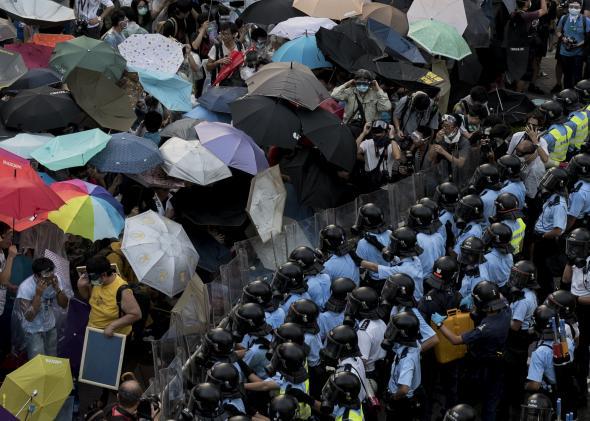When I was in Hong Kong last year, I wrote about what seemed to be a glaring contradiction in the “one country, two systems” arrangement between Hong Kong and the People’s Republic of China. Hong Kong is theoretically supposed to be moving toward full democracy, with the city’s chief executive to be elected by universal suffrage in 2017. At the same time, Hong Kong is supposed to be integrating with the rest of China—Beijing has pledged to recognize the territory’s political independence until at least 2047. What happens after that is anyone’s guess.
The tension between these two goals—of simultaneously becoming more democratic and more Chinese—finally caused an eruption this week when tens of thousands of demonstrators jammed the city’s streets, and were met with tear gas and pepper spray from the police.
Street protests are common in Hong Kong, and the movement behind the current marches, Occupy Central With Love and Peace, has been operating since last year. But the events of the last few days, and the harshness of the crackdown by the authorities, are on an unprecedented scale in Hong Kong’s recent history, recalling the 1967 demonstrations against British rule. Back then, it was pro-Beijing sympathizers fighting against foreign colonialism. Today, Beijing is viewed as the colonist.
The current round of unrest kicked off in late August when Beijing announced its vision for what the post-2017 election system would look like. Currently, the chief executive is chosen by an election committee whose members are picked by “functional constituencies,” mainly representing business interests as well as labor unions and some social services groups. According to the new model, Hong Kong citizens will have the right to vote for the chief executive after 2017, but candidates will have to be approved by the election committee.
The protesters believe this would make it difficult if not impossible to elect any candidate who didn’t toe the Beijing party line. As Jasper Tsang, the pro-Beijing president of Hong Kong’s legislative council, put it in a meeting with myself and several other U.S. journalists last year, “We have to design a system that’s considered fully democratic in which no pan-democrat can ever be elected.” The people of Hong Kong, evidently, aren’t buying it.
Contentious as they’ve been, Hong Kong politics have long been a bit of a niche issue for the global media. But the heavy-handed overreaction to the “umbrella revolution,” as it’s been dubbed for the means by which protesters have been defending themselves from tear gas, may have implications far beyond Causeway Bay.
China, to put it mildly, has an image problem. The majority of the world’s population seems to have concluded that China is supplanting the United States as the world’s economic power, and most people around the globe feel its economic rise has been, on balance, good for their own country. But overall views of the country and its political system are a lot more mixed.
Hong Kong has benefited from China’s economic boom more than almost any other place on Earth. Ironically, this is due in large part to the parts of the Chinese system that are still somewhat dysfunctional: Foreign companies that want to invest often feel it’s safer and easier to be based in Hong Kong; mainland shoppers believe the products in Hong Kong’s stores are of superior quality. Yet, despite the benefits, Hong Kong citizens are still understandably wary about ceding more of their cherished political autonomy. And the authorities are evidently unwilling to put up with the dissenters anymore.
The clashes could make it harder for Beijing, for instance, to sell the Taiwanese on the idea that they can preserve their current political system while continuing to integrate with the mainland.
Beyond its borders, China has attempted to sell the world on the idea that its growing prominence is a “peaceful rise,” of no threat to neighbors or overseas partners. The images emerging from Hong Kong don’t support that viewpoint. With Xi Jinping unlikely to back down, its seems quite possible right now that more extreme force may be employed in full view of the global media. (As Max Fisher notes, the heavy coverage of the protests in the international press has made China’s move to push foreign journalists out of the mainland, forcing them to cover the country from bureaus in Hong Kong, look pretty foolish.)
The most worrying thing for Beijing may be that younger Hong Kongers are supporting the protests in higher numbers than their parents. Over time, the number of people in the city who consider themselves Chinese has fallen, even as Hong Kong and China have become more economically integrated.
The “one country, two systems” period should have been an opportunity for Beijing to sell the benefits of the Chinese model to a skeptical Hong Kong, but that pitch seems to be backfiring. And if China can’t sell itself to Hong Kong, how will it sell itself to the rest of the world?
